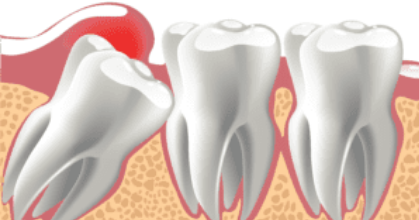Have you ever been told you have an “impacted tooth” from your dentist or orthodontist and wonder what it means? In the dental world, impacted means a tooth has not come in as expected due to lack of space or it coming in the wrong direction.
Impacted teeth are usually a result of a lack of space in the mouth. This can occur for a number of reasons:
- Overcrowding: The most common reason for tooth impaction is simply a lack of space in your jaw for all of your teeth. This might be due to genetics, leading to larger than average teeth or a smaller than average jaw.
- Wrong angle of growth: Sometimes a tooth might start growing in the wrong direction and become stuck or “impacted” against another tooth. This is common with wisdom teeth, which often do not have enough room to grow normally.
- Early or late loss of baby teeth: If baby teeth are lost too early, the remaining teeth can shift into the open space, which could interfere with the eruption of adult teeth later. Similarly, if baby teeth remain in place too long, they can prevent the proper eruption of adult teeth.
- Physical obstruction: Some conditions or circumstances can lead to physical obstructions that prevent a tooth from erupting normally. This might include cysts, tumors, or extra teeth.
- Genetic factors: Certain hereditary conditions can also increase the likelihood of impacted teeth. For instance, people with certain craniofacial disorders might be more prone to tooth impactions.
The most commonly impacted teeth are the wisdom teeth (third molars), followed by the maxillary canines. An impacted tooth may not always cause discomfort, but it can lead to oral health issues, such as infection, damage to adjacent teeth, and misalignment. Thus, it’s important to have regular dental checkups to catch and address any potential issues early.
What Causes and Impacted Tooth?
Genetics
There are different things that can cause a person to have an impacted tooth, however genetics are often to blame! If a parent had a tooth that did not erupt as a child there, is a good chance their child will experience something similar.
Wisdom Teeth
It’s very common when people experience impacted wisdom teeth. Often times, there is just not enough space in the mouth for them to fully erupt!
Baby Teeth Not Wanting to Fall Out
It’s very common for children who are in the process of losing teeth to experience an impacted tooth. A tooth can get trapped in the gums if a baby tooth does not fall out in time, or if something is blocking the path of the permanent tooth as it’s coming in. In these cases, the tooth may never erupt at all or come in in the wrong place/position. This can often cause harm to the roots of the neighboring teeth and force them into unhealthy positions. Crowding is common in these instances which would require a visit to your orthodontist.
Fixing an Impacted Tooth
Fixing an impacted tooth can be relatively simple, however there are times it can become fairly complicated. This all depends on the position of the impacted tooth and what direction it is trying to come in.
Extracting a Baby Tooth
One of the most common reasons a child’s tooth will not fully erupt is because the baby tooth below it will not fall out. One of the easiest solutions for your dental professional is to extract the baby tooth to allow space for the permanent tooth to come in. However, this doesn’t always mean the tooth will come in perfectly straight. Permanent teeth are typically bigger in size than baby teeth, so many people genetically do not have enough space in their mouth. This results in over-crowding.

